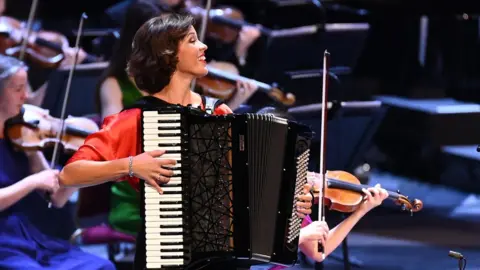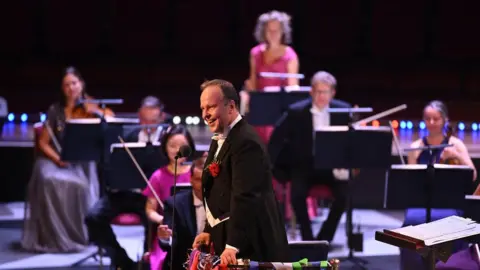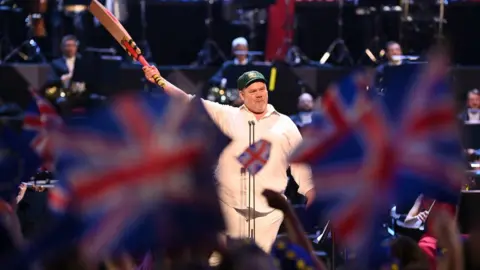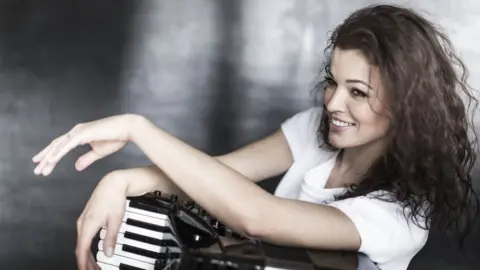Last Night Of The Proms: Accordion tangos end season on a joyous note
 BBC
BBCIt may have been her first visit to the BBC Proms, but accordion player Ksenija Sidorova stole the show at the Last Night concert.
Expressive and passionate, the Latvian musician's performance of Astor Piazzolla's Libertango brought a packed Royal Albert Hall to its feet.
It came halfway through a diverse concert that also paid tribute to the victims of the 9/11 terror attacks.
Conductor Sakari Oramo said the night reflected the "healing power of music".
"Due to the worldwide Covid pandemic, live music-making was stopped across the world for many months - and in some places it still is," he said.
"Music that is core to human expression went silent. The bond between audiences and performers was broken."
Noting that, elsewhere in the world, people's freedom to make and enjoy music was currently being "threatened and denied", Oramo concluded that it was "very special for us all to be here for the Last Night Of The Proms again, with an audience, to celebrate the healing and uplifting power of music".

The Prommers, bedecked in crowns, bow ties, bowler hats and a mixture of EU and union flags, were typically enthusiastic, especially after missing out on the 2020 season.
They bobbed up and down to the Sailor's Hornpipe and sang Land Of Hope And Glory at the top of their lungs- the lyrics performed in full following a very public row over their possible exclusion last year.
And when Oramo paid tribute to Sir Henry Wood, the founder conductor of the Proms back in 1895, one audience member pointed to Wood's statue at the back of the hall and shouted, "He's behind you!"
World premiere
The concert opened with a new commission, Mother, by Iranian-American composer Gity Razaz.
A restless symphonic piece with an extensive percussion section, it depicted the healing power of nature amid the chaos of modern life.
Speaking ahead of the premiere, Razaz said she hoped to capture "the exquisite majesty of our natural world" in a way that "propels us to take more serious, proactive steps towards protecting our planet".
The programme also included a heart-breaking new arrangement of Barber's Adagio For Strings, marking the 20th anniversary of the 9/11 attacks.
Allow X content?

The adagio was performed at the Last Night in 2001, just four days after the atrocity, with American conductor Leonard Slatkin on the podium. He asked the audience not to applaud at the end. Instead, they held aloft candles.
Jonathan Manners' new arrangement was suitably sombre and haunting, incorporating Barber's 1961 choral setting of the Latin text Agnus Dei: "Lamb Of God that takest away the sins of the world have mercy upon us [and] grant us peace".
The programme also included a recently rediscovered piece by Florence Price - the first African-American woman to have a symphony performed by a major US orchestra - and Ravel's lament for the victims of World War One, Le tombeau de Couperin.
Australian tenor Stuart Skelton brought some levity with a spirited performance of Iain Farrington's I Still Call Australia Home, delivered in an eye-catching black sequinned jacket.
Later, he led the audience in the traditional chorus of Rule, Britannia! wearing a full Aussie cricket outfit.

Skelton also indulged in his love of Wagner, performing the poignant Wesendonck Lieder with a rich subtlety, before letting rip on the passionate Prize Song, from The Mastersingers of Nuremberg.
The 53-year-old, who was also making his debut at the Last Night, said he was still pinching himself after being invited.
"To be considered in that pantheon? You never expect that one. It's one of those bucket list, dreams come true," he told the BBC. "It's like a wrap party for the world's most prestigious music festival."
He even came up with a bespoke cocktail to celebrate the occasion.
 Dario Acosta
Dario AcostaFor all his charm, accordion virtuoso Sidorova was the indisputable highlight of the night, introducing the Last Night to two mildly revolutionary elements- the accordion and the tango.
She first took the stage in the first half, playing Franck Angelis' Chiquilín de Bachín (Little Boy at Bachín), a saccharine story of a six-year-old boy who sells flowers outside a cheap restaurant in the heart of Buenos Aires's theatre district.
Sat on a piano stool, sporting some impressively voluminous sleeves, Sidorova imbued the piece with a nostalgic quality, deftly swerving maudlin sentimentality.
But it was her second-half performance of Libertango - a staple of Strictly Come Dancing - that really showcased her captivating and witty playing style, as she traded riffs back-and-forth with the BBC Symphony Orchestra.
Viewers and prommers alike lapped up the performance.
Allow X content?

Allow X content?

Allow X content?

Allow X content?

The pomp and ceremony of the Last Night - described by Rob Rinder on BBC Radio Three as an "upmarket stag do" - marked the end of a triumphant six-week Proms season.
Coming a year after the festival was reduced to a two-week, socially-distanced skeleton, this year's event welcomed 2,000 musicians, 30 orchestras and, crucially, tens of thousands of fans.
Highlights included the highly-anticipated concert debut of John Wilson's Sinfonia of London, who played a soul-stirring and charismatic programme that included Strauss, Ravel and Korngold's filmic Symphony in F sharp major.
Chineke - the UK's only black and ethnically diverse orchestra - celebrated diversity in composers as well as performers, playing pieces by Samuel Coleridge-Taylor, Fela Sowande and Florence Price.
The Aurora orchestra played Igor Stravinsky's 1945 suite from The Firebird from memory (as is their tradition); while the prodigiously talented Kanneh-Mason family joined forces to perform an updated version of Camille Saint-Saëns's much-loved suite The Carnival of the Animals.
Allow Google YouTube content?
One of the most emotionally-charged concerts was delivered by The Proms Festival Orchestra - an ensemble of leading freelance players who were specially assembled to acknowledge the difficulties they faced during the pandemic.
The 80-piece orchestra included a double-bassist who'd taken up a job as an undertaker and a harpist who'd started working in a vineyard to make ends meet.
Their performance of Mahler's Fifth Sympony was called "stirring" and a "triumph" by The Times.
A collection was held at the Last Night to support a hardship fund for freelance musicians who have found themselves in financial difficulties after the last 18 months.
The Proms will return next year on Friday, 15 July.

Follow us on Facebook, or on Twitter @BBCNewsEnts. If you have a story suggestion email [email protected].
